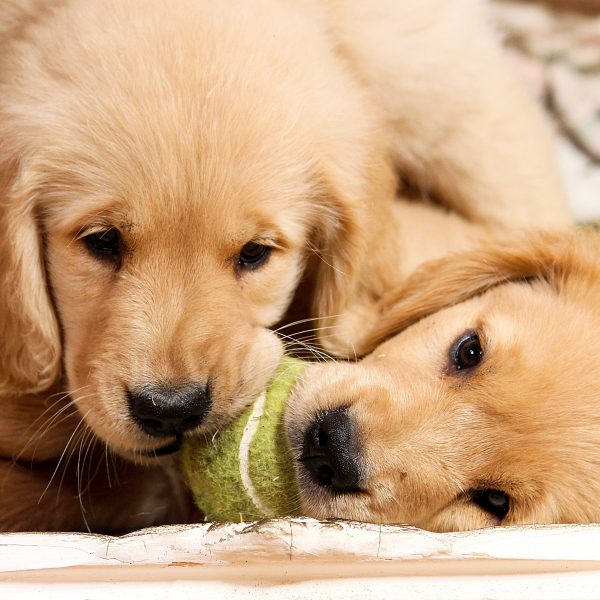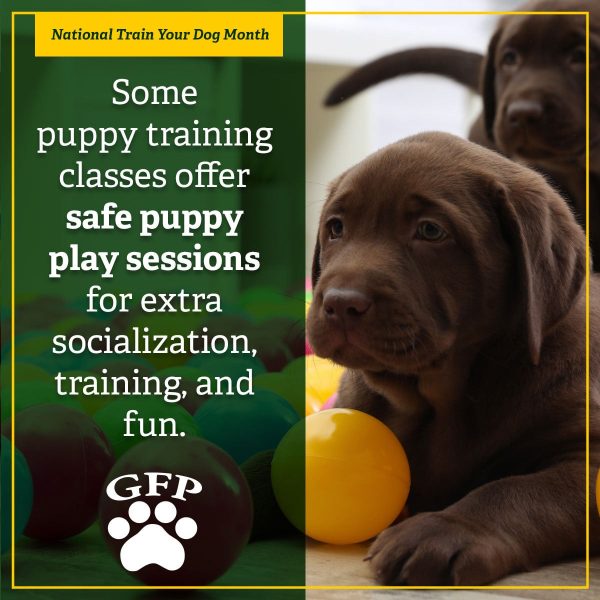6 Tips for Safe Puppy Play Sessions

Puppy play sessions can be a great way to socialize a puppy and use up some energy. But, it can get out of hand if you don’t monitor things or work on training throughout the process. Here are some tips for safe puppy play sessions:
1. Understand How Dogs Communicate While Playing
Dogs communicate differently than humans do. It’s important for you to learn basic dog body language cues and also understand how dogs communicate while playing.
Sometimes, play can look like fighting to the human eye. Understanding body language from the canine perspective can help you determine whether dogs are playing or fighting and also head off issues before they happen.
When the balance shifts and one dog stops having fun, problems can occur if body language is ignored and things keep going. Dogs have different play styles, temperaments, levels of socialization, etc., so you want to be aware when your dog is playing to be able to catch signs that things are heading the wrong way.
Some signs that a dog isn’t having fun include stiff, controlled movements, pressed lips and closed mouth, ears pinned back against their head, and body rigidity. At the same time, if the other dog shows these signs or attempts to flee the interaction and isn’t just wanting to be chased, it’s a sign that they’re done playing as well and your dog should leave them alone.
2. Make Sure Your Puppy Responds to Basic Commands
Good training and obedience are key to a safe puppy play session and you want to make sure that your puppy responds to basic commands. You need to have confidence in your dog’s training before you let them loose to play with others, especially in a more uncontrolled situation like a dog park.
You need to be able to communicate easily with your dog to encourage them toward more acceptable play or to call them off if they are missing important body language cues from their playmate.
Especially in a wider, more open space, like a park or a dog park, you want to be confident that your puppy will respond to your recall cues. This is a critical step if you are going to have them play with others.
3. Start With More Controlled One-on-One Sessions
If you’re still in the learning stages and your puppy may not be quite ready for bigger spaces and situations, puppy training classes can be a good source for both training and socialization.
You can also keep play sessions one-on-one and in a smaller, more controlled environment to help both puppies work on training, acceptable play, and learning canine social cues.
4. Match Size and Play Style
When you are just getting started and are trying to work with smaller play sessions, take the time to match size and play style as closely as possible. When puppies are still learning, big size discrepancies can result in accidental injuries, more anxiety between the dogs, and more.
So, it’s generally better to start out with playdates between puppies of similar sizes. You also want to try and match up their play styles. All dogs play differently and if the styles are complete opposites, it can create friction instead of fun.
5. Look Into Puppy Parties Before You Go
A “puppy party” can be a good resource once your puppy is more socialized and well-trained. These may be tempting to jump in with as a starting point, but you do want to be careful and look into them first.
One-off puppy parties tend to be chaotic and can be a breeding ground for issues because they often just result in a bunch of untrained, unsocialized puppies in one place together. This creates the perfect situation for an unsafe puppy play session that is often more stressful than helpful.
However, a puppy party that requires an entry evaluation to ensure all attendees pass temperament checks and other measures can be a great experience for your puppy. Puppy parties with more structured environments and formats with some checks and balances in place for off-leash play can be a great opportunity for your puppy to socialize and play. This can be one of the benefits of doggy daycare.
Some puppy training classes may even include safe play sessions as part of their classes. This is another one of the reasons they can be a great way to socialize a puppy. And, it’s one of the many benefits of puppy training classes.
6. Pay Attention to Your Dog and Step in When Needed
One of the important tips for safe puppy play sessions is to supervise the interaction closely, pay attention to your dog, and step in when needed. You don’t want to force your dog to play if they don’t want to. If they are shy, let them ease into it at their own pace.
Once they are playing, make sure you pay attention and step in when you see something concerning. Also, you should be able to be comfortable asking the owner to step in if their dog is getting out of hand.
If you see your puppy getting overwhelmed or they are trying to hide behind your legs to get away and the other dog keeps coming, ask the owner to step in. Or, make sure you step in and hold back your dog for a second if your dog is the one coming on too strong.
Take a second to call off or hold back the dog that is coming on too strong and allow the overwhelmed puppy to make a choice. If they come back to initiate play, it’s fine. If they escape, hide, or go take a drink, that’s a sign that they need a break and the other dog needs to back off for a little bit.
If your puppy is the one that tends to come on too strong in play sessions, then you know you need to do some extra work on training and socialization. It may also be a good idea to work on some calming cues.
It’s also possible your puppy comes on too strong during play sessions because they have too much pent-up energy and aren’t getting enough exercise outside of those play sessions. If this seems like the case, take them on a walk or have a short play session with them yourself before going to the puppy play session.
These are just a few tips for safe puppy play sessions. Play and interaction with other dogs and people as your puppy is growing are essential to a confident, well-socialized dog, which are also benefits of dog friendships. By following these tips, you can help keep early play sessions safe for your puppy and others.

